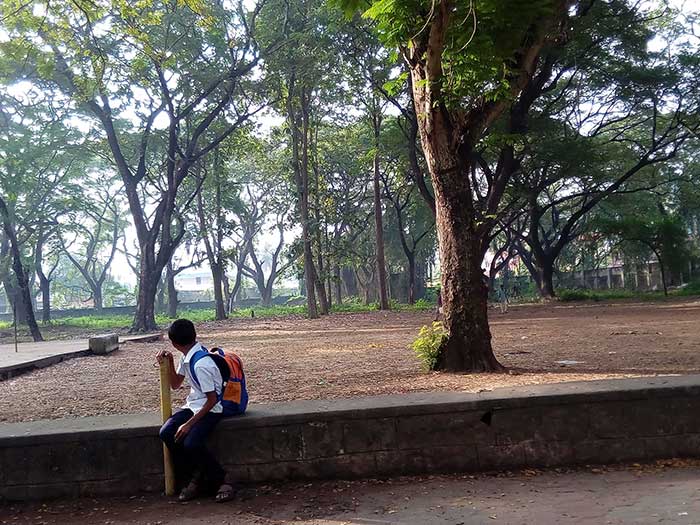
Recent new initiatives of the Punjab government to bring real greenery to the state need to be widely welcomed. This state really needs environment protection, particularly as what was falsely called green revolution in farming caused such immense ( and entirely avoidable)ecological ruin. The new measures announced show much promise of increasing the overall green cover, and if adequate precaution is exercised, then these can contribute a lot.
Under the first such initiative, the forests department will be creating 101 new bagichis ( nurseries) named after Guru Nanak Dev in urban areas. This is a very noble work. What I would like to emphasize here is that this should become the hub for protecting diversity of indigenous trees. It has been seen in the past that often there is a preference for exotic trees and this is matched by a desire for more decorative plants generally among people. However for environment protection indigenous trees are best suited and broad leaf, dense species more conducive to many birds and life-forms getting shelter and food, providing better soil and water conservation as well as shade, can be very useful. On the other hand exotic species like eucalyptus may deplete water instead of conserving it, and are also not good for green undergrowth and for bio-diversity. These new nurseries should promote indigenous species biodiversity as well as promote organic urban gardening. The ecological , health and safe food benefits of urban gardens and kitchen gardens should be widely spread. Greening and gardening should be spread not just in elite areas but in and around the areas where the urban poor live. Public parks must go organic and schoolchildren should be taken more often to such bigger organic gardens, while at the same time smaller organic gardens can emerge in and around schools also. In the new nurseries and elsewhere, trainings of city maalis ( gardeners) should be organized on indigenous biodiversity and organic gardening, composting etc. Another important aspect for urban greenery is to stop spraying chemicals on fruit trees. As brought out in the case of recent parrot and other bird deaths in Faridkot, this can be very harmful.
The second initiative relates to the creation of 128 pavittar van (sacred forests) in the name of Guru Tegh Bahadur on the panchayat and forest lands, again a very noble idea. Here again indigenous biodiversity should be emphasized while monoculture of exotic or commercial varieties should be completely avoided. The attempt should be as far as possible to try to mimic a natural forest for healthy growth, after understanding this properly in the context of local conditions. Further there can be initiatives to involve the rural landless in this and to make available sustainable livelihoods to them in this work. One model is to pay them wages for this work while the plants are coming up, but when plants have grown into trees then the landless families can get rights over the minor forest/tree produce from in and around this land including fodder, while a smaller land in and around can be given to them for a little farming and animal husbandry as well.
The third initiative which has been announced is to create 12 forest and nature awareness parks during this financial year. As such a park cannot be created in a year, there should be clearer longer-term commitment for budgetary support. Awareness of nature and environment is really needed in a state which has virtually invited a host of serious environmental and related health problems by wrong policy decisions in recent decades. One hopes such nature parks do not get overwhelmed by more tourism and entertainment-oriented aspects and serve a much more useful role which is really needed.
Punjab Chief Secretary Vini Mahajan recently announced massive tree plantation. She has asked the forest department for free distribution of 25 lakh free plants to people. Again one hopes that indigenous biodiversity will be emphasized. Another senior official has stated that ‘tall’ trees are being emphasized the most in highway planting. If this means exotic trees like the eucalyptus then this is a mistaken choice. Dense broad leaf species with more soil and water conservation and shade and shelter for birds and bees will certainly be a better choice. Monocultures of tall exotic trees are more prone to falling in stormy winds and will create more road traffic stoppages and risks.
Another initiative is to take up green regeneration in more soil erosion prone areas like those in the foothills. Here again it is important to emphasize the potential of linking this with sustainable livelihoods of rural landless households. In the pre-election days the state government is also under some pressure to take up schemes for the landless and the likelihood of this happening is higher now, but such schemes to be successful involve longer-term commitment and this must be clearly stated and recognized officially in the related documents.
Bharat Dogra is Honorary Convener, Save the Earth Campaign Now. His recent books include Planet in Peril and Man Over Machine.
Related posts:
Related posts:
Views: 0
 RSS Feed
RSS Feed

















 July 17th, 2021
July 17th, 2021  Awake Goy
Awake Goy  Posted in
Posted in  Tags:
Tags: 
















